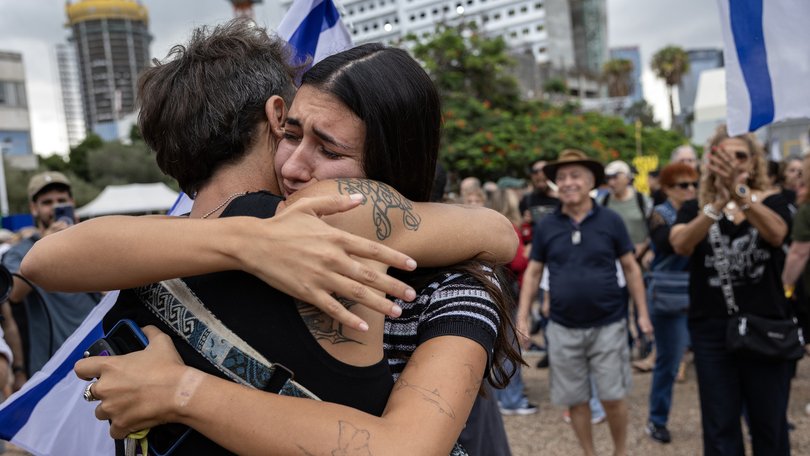Israel breathes a sigh of relief after Trump’s Gaza peace deal — but many ask why it took two years
Israel erupts in relief after Donald Trump’s Gaza deal ends the war, but for many, the question now is why peace took two long years to arrive.

A sense of elation swept across Israel on Thursday as many awoke to the news that a deal meant to end two years of war had been reached overnight.
Some people had not even gone to sleep, glued to bulletins about the deal’s progress on their TVs and phones.
“What could feel better than the thought that all the hostages will return,” said Oz Isuk, 51, a Jerusalem resident who works in security.
Sign up to The Nightly's newsletters.
Get the first look at the digital newspaper, curated daily stories and breaking headlines delivered to your inbox.
By continuing you agree to our Terms and Privacy Policy.“Thank God, we’ll end this saga, the war will end, we can finish a bad chapter in our lives and begin to rehabilitate ourselves as a nation.”
At around 3am, shortly after a deal was announced, former hostages who had been released during a brief ceasefire this year rushed to the central plaza in Tel Aviv that has become known as Hostages Square. They came together to celebrate after an agonising, monthslong wait for the release of the captives still held in the Gaza Strip who were seized during the Hamas-led attack in October 2023 that ignited the war.
Later in the morning, with much of Israel off work for the Jewish festival of Sukkot, people danced in circles in Hostages Square. Along a main Tel Aviv thoroughfare, billboards had appeared that read, “Thank you President Trump.”
In Jerusalem, former hostages joined crowds of worshippers for prayers at the Western Wall.
The family of Alon Ohel, a hostage, said Thursday, “We received the news of the agreement that has been reached with tears of joy.”
Mr Ohel was captured at a roadside bomb shelter after fleeing the Nova music festival, where more than 380 people were killed.
“Our family is wrapped in the embrace of all the people of Israel, and we embrace the people of Israel in return,” the family said in a statement.
The family thanked Israeli Prime Minister Benjamin Netanyahu, President Donald Trump and the Israeli soldiers “who fought for our Aloni.” The statement added that the family had not yet received any official notification about when their son might be released.
Despite the general sense of exhilaration, some Israelis expressed frustration that it had taken their government so long to reach this point.
“There should be no doubt, this deal came about solely because of President Trump,” Yehuda Cohen, father of Nimrod Cohen, a 21-year-old soldier held in Gaza, told an Israeli TV channel on Thursday.
He said the family felt “betrayed” by the government, adding, “We need to enter into a long period of rehabilitation, not only for Nimrod, but for the country.”
Mr Netanyahu’s right-wing government and the two-year war have polarised Israel. Critics say that policy and intelligence failures led to the country’s being surprised by the October 2023 attack.
Like Mr Cohen, many Israelis say they believe Mr Netanyahu prolonged the war to stave off a public reckoning and to appease his far-right political partners who wanted Israel to keep fighting and establish permanent rule in Gaza.
News of the deal prompted questions about the stability of the government as Israel entered an election year, with the next national vote scheduled for October 2026 at the latest.
For months, hard-line members of the coalition, including the finance minister, Bezalel Smotrich, have threatened to resign and bring down the government if Mr Netanyahu ended the war without having fully destroyed Hamas.
Mr Netanyahu relies on the support of far-right parties to remain in power.
The deal was set to be voted on by the Israeli government Thursday evening and, despite opposition from far-right members, was expected to pass.
In a long post on Thursday, Mr Smotrich wrote that he could not join in the “shortsighted celebrations” and vote for the deal.
He said that he feared the consequences of Israel’s agreeing to exchange the hostages for scores of Palestinian prisoners, whom he described as “the next generation of terror leadership.”
But Mr Smotrich also took credit for demanding that all the hostages be released at once and for pressuring the government to apply “the military pressure that forced Hamas to fold.”
He also stopped short of threatening to quit the government at this stage.
The details of how the deal might play out, beyond the first phase of a hostage and prisoner exchange, remain unclear. Centrist and left-leaning opposition parties have offered their support for the deal but thanked Trump for achieving it, rather than Mr Netanyahu.
“A grateful nation thanks President Trump for the return of the hostages, for the peace he has brought to the region,” Yair Lapid, the centrist leader of the opposition, said in a statement.
In Hostages Square, the hundreds who had gathered Thursday under a light rain — considered a blessing after a long, dry summer — were intent on celebrating.
The square has served as a site for outpourings of joy when hostages were released and for protests and grief when hostages were found dead or past negotiations collapsed.
“I’ve been to this place so many times, cried,” said Larry Rapoport, 78, who returned there Thursday. “Today, those are tears of happiness.”
© 2025 The New York Times Company
Originally published on The New York Times
